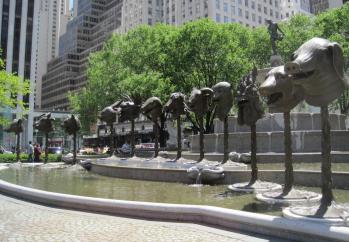This past week, on a sunny spring day, I went on my lunch hour to see a new public art installation in midtown Manhattan:
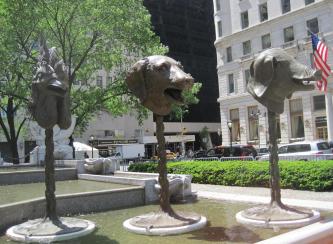
|
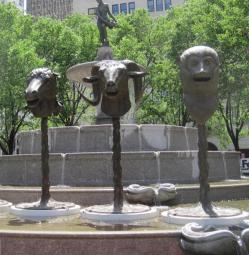
|
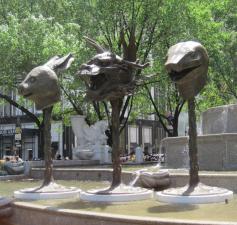
|
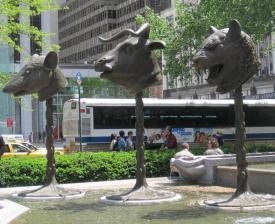
|
This exhibit, “Circle of Animals/Zodiac Heads“, is noteworthy for being created by the internationally famous Chinese artist Ai Weiwei. After being chosen to design the “Bird’s Nest” stadium for the 2008 Beijing Olympics, he was considered a national hero; but when he used that prominent platform to speak out against government corruption and censorship, the thuggish despots who rule China abruptly did an about-face.
At the beginning of April, Ai Weiwei was disappeared by the Chinese government, and his status and whereabouts have been unknown since then in spite of an international campaign calling for his release. Nevertheless, the exhibits he had designed and planned before his arrest continue to be unveiled all over the world, often with pointed jabs at China during the ceremonies. (At the unveiling of this one, a curator at the Guggenheim read an apt quote: “Without freedom of speech there is no modern world, just a barbaric one.”)
These sculptures represent the twelve animals of the Chinese Zodiac, but their somewhat generic appearance hides a pointed message. I’ve read that they’re a deliberate homage to twelve similar sculptures which were once part of a famous fountain on the grounds of the Chinese imperial family’s Summer Palace, but which were stolen when the complex was looted, sacked and burned by the British and French during the Second Opium War of 1860. Only five have since been returned to China; two others have been found, but the owner has refused to repatriate them.
With this history in mind, the exhibit is a subtle statement about the harm done by imperialism. But under the present circumstances, it’s possible to discern another layer of meaning in it. The absence of the original sculptures was and is a long-remembered symbol of Chinese national humiliation. In their new incarnations, they more powerfully call attention to the absence of their creator – and remind the world of the shame and ignominy the current Chinese government has brought upon itself through its outrageous arrogance in believing that it can control all human expression through brutality.
